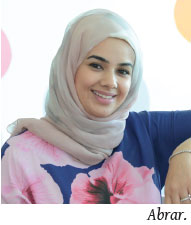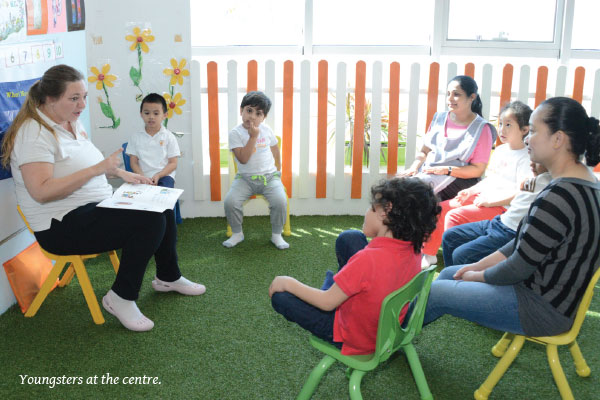Abrar Darwish runs a child development centre that supports children with communication difficulties. Behnaz Sanjana met with her to learn why this is so important.
Little Village Center is a bright, cheerful place for children aged between18 months and seven years who present with learning, communication or behavioural difficulties. The centre offers the children the opportunity to play, develop and flourish. Established in May of 2015, the centre works with children and their families to support their communication and learning skills, with the aim of integrating them into a mainstream school setting with their peers.
A qualified speech and language therapist herself, centre director Abrar Darwish says: “Our students have a range of different communication difficulties and struggle to get accepted into pre-schools. Unfortunately, many private schools on the island do not cater to children with special needs, and therefore there is no way forward for them. Special needs centres in Bahrain are limited and the majority provide either individual counselling sessions or are long-term prospects for the children, giving them little opportunity to integrate with regular children in the future. We aim to be a stepping stone for our student, working on developing the skills they lack and enabling them to join conventional schools.”

The centre is close to completing its first academic year, and out of the 30 students enrolled a few are now ready to graduate to a regular school. Abrar says: “Our success lies in our children progressing to regular schools in a year or two. But a child’s abilities decide whether they can move on. For those who do, we will ensure that they receive the necessary support from us. Our staff will follow-up on their progress even after they move on, making it easier to adapt to a regular school.”
Abrar hopes that more schools will open their doors to their students, enabling them to grow and interact in a normal environment. She feels this is imperative, as their social interaction must happen in a natural setting. “Children learn by observing others, and the more they are with normally developed peers, the better their progress,” she says.
“Each child is assessed to identify the gaps in their development and an Individual Education Plan is developed. The centre is set up as a normal pre-school; with specialised teachers, a daily routine and both child-initiated and adult-led activities. The schedule also incorporates individual therapy sessions with a speech and language therapist, occupational therapist, behaviour therapist and music therapist. So, throughout the day, each child receives individual therapy sessions depending on their needs, as well as opportunities to be part of a group and a class, which allows them to develop their social skills.”
At Little Village Center, children get used to a classroom setting and learn to adjust to a routine. They are taught to follow a schedule, participate in class activities, have snacks independently, hold a pencil and line up, all of which are skills that are essential for them to integrate into a mainstream school setting.
To reinforce their learning, the children’s families are involved in their progress. Parents receive a report on their child’s activities every day. Weekly emails allow them to see pictures and videos of what the children have been learning and regular review meetings enable them to assess how close the child has come to a particular objective. “We are also developing a mobile application that will provide the parents with information, pictures, and the child’s progress, enabling them to discuss what they did at school with their children. To increase the families’ involvement further, the children are sent home with individualised activities to work on with their parents,” says Abrar.
The centre also conducts workshops for parents, and Abrar is planning on organising special evenings for parents to meet and discuss their doubts and difficulties with others who understand their challenges.
Abrar goes on to stress the importance of early intervention services for children who exhibit symptoms of delayed development. “Often parents approach us when the child is four years old, which is a bit late. I urge parents to follow their gut feeling and to seek help for their child earlier on. The sooner a child and their family receive support, the better the chances of them being able to overcome their difficulties.”


































